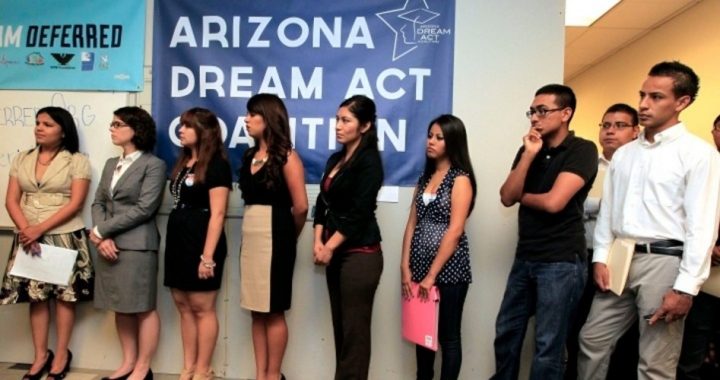
Homeland Security Secretary Janet Napolitano announced October 24 that about 200,000 young illegal immigrants have applied to defer their deportation, and more than 3,000 young illegals are applying every day under the Obama administration’s new immigration policy.
Napolitano communicated these statistics to a panel of teachers and education experts in Washington who serve on the agency’s Academic Advisory Council. Several panel members, including Antonio Flores, president of the Hispanic Association of Colleges and Universities, touted the White House’s effort as a crucial immigration policy change.
The Department of Homeland Security (DHS) launched the program earlier this year to redirect its resources to deporting dangerous criminals who entered the country illegally, while giving the slip to non-criminal illegal immigrants. Specifically, the policy permits people under the age of 31 who crossed the border illegally before they were 16 to apply for a deferment that would allow them to stay in the United States for a two-year renewable period.
“Deferred action is a discretionary determination to defer removal action of an individual as an act of prosecutorial discretion,” the agency reports, in outlining the policy. “Under this process, USCIS [United States Citizenship and Immigration Services] will consider requests on a case-by-case basis. While this process does not provide lawful status or a pathway to permanent residence or citizenship, individuals whose cases are deferred will not be removed from the United States for a two year period, subject to renewal, and may also receive employment authorization.
In addition to the age requirement, the agency lists the following requirements for deferment eligibility:
• You entered without inspection before June 15, 2012, or your lawful immigration status expired as of June 15, 2012
• You are currently in school, have graduated or obtained your certificate of completion from high school, have obtained your general educational development certification, or you are an honorably discharged veteran of the Coast Guard or Armed Forces of the United States
• You have not been convicted of a felony, significant misdemeanor, or three or more misdemeanors, and do not otherwise pose a threat
• You were present in the United States on June 15, 2012, and at the time of making your request for consideration of deferred action with USCIS
“Our nation’s immigration laws must be enforced in a firm and sensible manner,” Secretary Napolitano said when announcing the policy in June. “But they are not designed to be blindly enforced without consideration given to the individual circumstances of each case. Nor are they designed to remove productive young people to countries where they may not have lived or even speak the language. Discretion, which is used in so many other areas, is especially justified here.”
While the program has become popular among Hispanics, Flores asserts, some people hoping to benefit from the new rules may be hesitant to apply, in fear that they will not qualify and the government will deport them. However, while 200,000 illegal immigrants have already applied, Napolitano expects a sharp increase in applications following the November elections. She added that each application takes at least four months to process, and that during that time period the applicant will not be deported.
“I suspect that we may see a bulge of applications after the New Year when there’s either this administration or a new administration and when the policies are going to be become more clear,” Napolitano told the panel.
The initiative has sparked criticisms from opponents who claim the policy is nothing more than a political ploy by the president to shore up Hispanic votes. In fact, the executively-ordained effort attracted political benefits for Obama during the Democratic National Convention in September when Democrats highlighted the policy.
One of the most convincing arguments against the program is that widespread fraud that might stem from it, as the DHS has not implemented the necessary barriers to verify that all people who apply are in fact eligible for the permit. In a letter to the agency, Rep. Lamar Smith (R-Texas) and Sen. Charles Grassley (R-Iowa) explained their concerns regarding the policy:
While potentially millions of illegal immigrants will be permitted to compete with American workers for jobs, there seems to be little if any mechanism in place for vetting fraudulent application and documentation submitted by those who seek deferred action. This administration will undoubtedly preside over one of the most fraud-ridden immigration programs in our history. Illegal immigrants will be eager to purchase or create fake documents showing that they arrived in the United States before the age of 16 and meet the continued physical presence requirements. DHS will be sorely taxed by the burden of disproving the evidence presented in each application.
According to the New York Times, the work permits that will be provided to these illegals — in an economy where unemployment hovers well above the seven-percent mark — are a path for other legal documents. “The work permit young immigrants can receive with the deferral opens many doors that have been firmly shut,” the newspaper explained. “They can obtain valid Social Security numbers and apply for driver’s licenses, professional certificates and financial aid for college.”
“That means illegal immigrants may well be impossible to deport,” The New American’s R. Cort Kirkwood previously reported. “Once the Land of the Free provides all these benefits, there isn’t much chance politicians will have the courage to take them away.”
Photo of young illegal immigrants in Arizona lining up for guidance on deferment: AP Images



